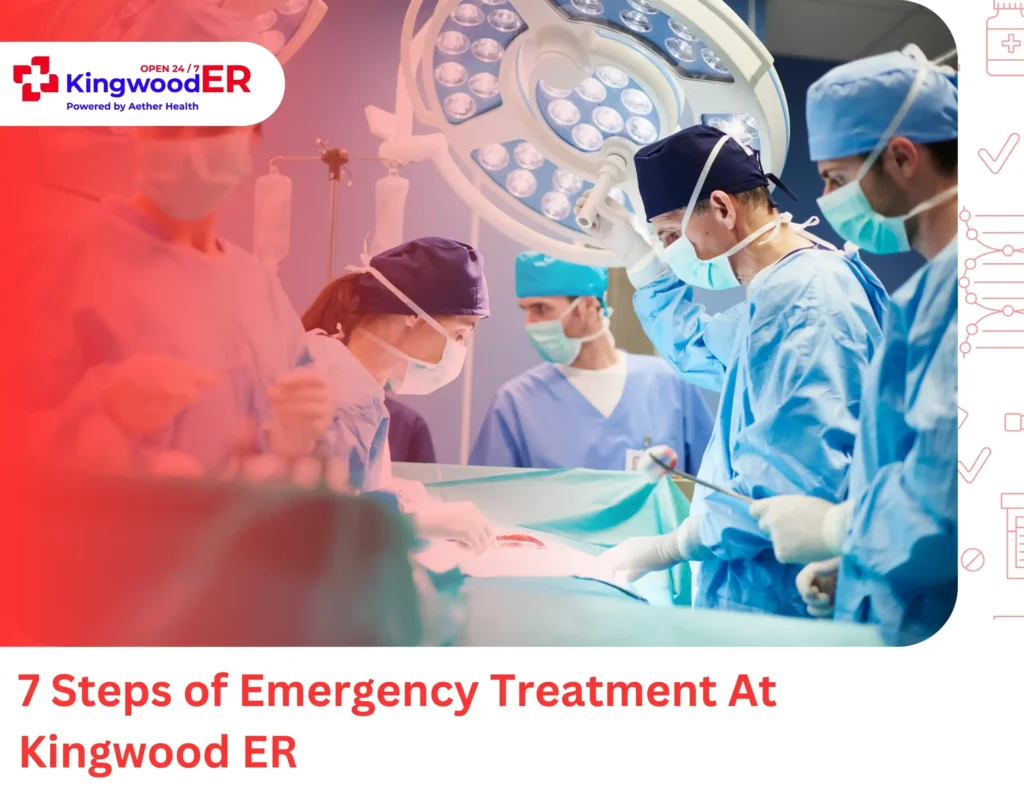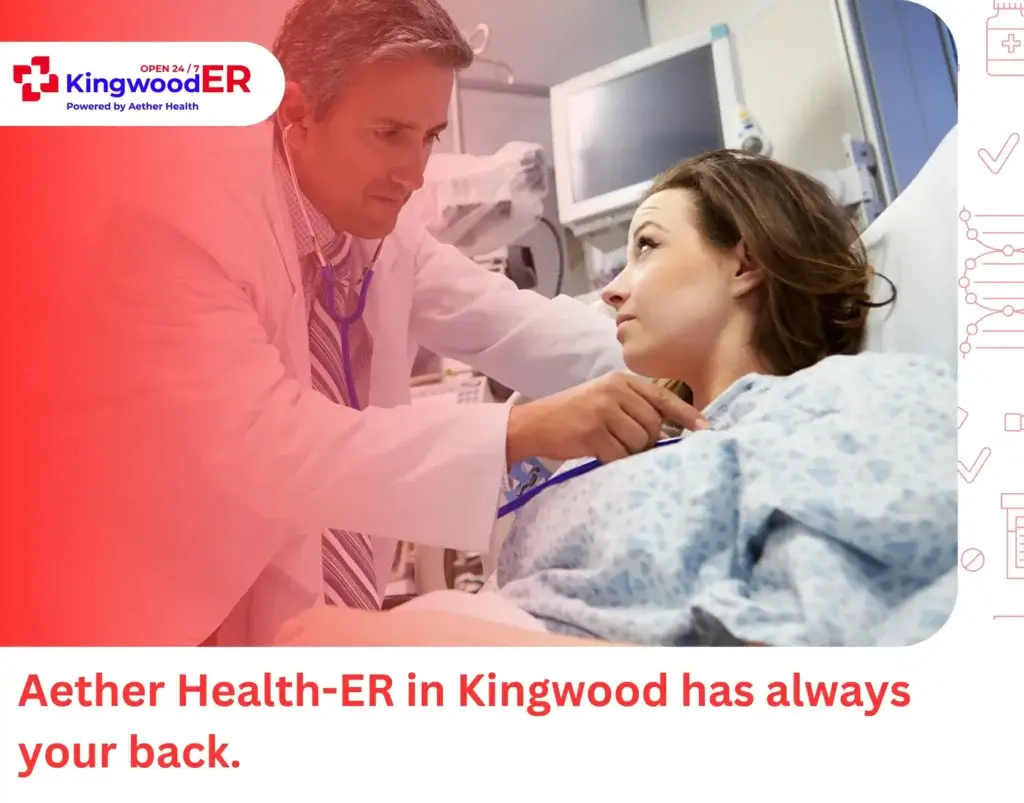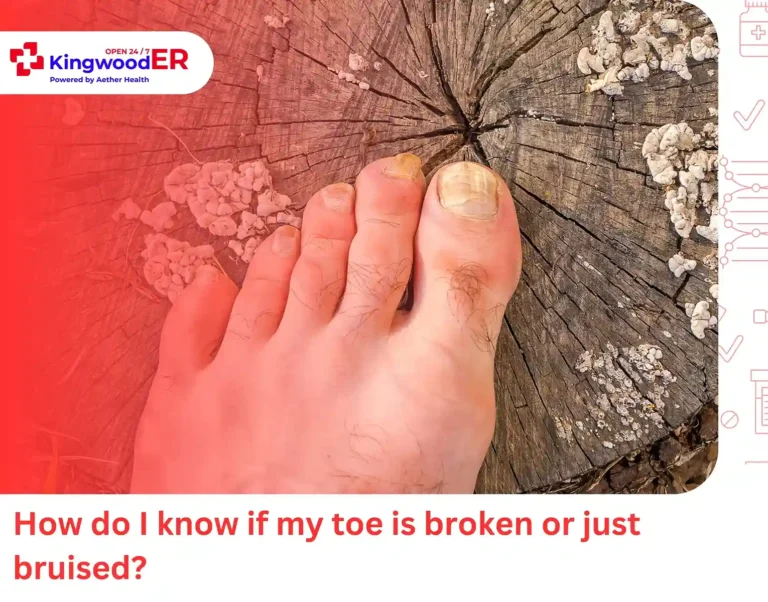A sudden injury or severe pain can drain you. You’re already feeling awful, and then there’s the stress of going to the emergency room. How long will I wait? Will they diagnose me properly? I already feel terrible—I’m not ready to deal with a crowded emergency room. We know, because we’ve walked this path with countless patients.
Your visit to Aether Health’s ER in Kingwood is different. Here, you’ll find quiet exam rooms, same-day test results, and a team that treats you with compassion and care.
Let’s walk through what happens from the moment you arrive until you’re ready to head home.
7 Steps of Emergency Treatment At Kingwood ER

At Kingwood Emergency Room, we’ve worked hard to create an environment that meets your expectations and makes the process smooth. Let’s walk you through our process:
Step 1: Triage
The first step in an emergency room visit is triage. A skilled medical professional will assess the severity of your condition. They’ll check your vital signs, ask about your symptoms, and determine the urgency of your situation.
First Aid
Patients with critical conditions receive immediate first aid at Aether Health such as:
- If you struggle to breathe, oxygen therapy may be provided through a mask or nasal cannula.
- For respiratory failure or blocked airways, you may be placed on a ventilator or undergo intubation.
- Cuts and lacerations are cleaned and closed with stitches, staples, or bandages.
- Severe wounds may require specialized tools like a tourniquet to stop blood loss.
- If you’ve severe pain, fast-acting pain relief is delivered directly into your bloodstream for immediate effect.
Step 2: Registration
If your condition is not critical when you come to ER Kingwood then this is usually the first step. Triage often happens simultaneously or immediately afterward, depending on the situation.
You check in at the front desk of Aether Health Emergency Room. Our friendly staff will greet you and ask for your basic information, such as:
- Name
- Date of birth
- A brief description of your emergency
- ID card
- Insurance card (if available)
This process helps us to determine the best treatment for you and help you with insurance coverage.
Step 3: Meeting Your Care Team
Then you’ll head to a treatment room where you’ll meet your care team including doctors, nurses, and specialists (if needed).
The doctor will ask questions about your medical history (surgeries, previous illnesses, etc.). This is when they will make an informed decision about your treatment. You’ll genuinely feel heard and supported during this moment.
Note: Patients usually shouldn’t eat or drink in the emergency room as you may need tests or procedures that require an empty stomach.
Step 4: Diagnostics & Testing
Depending on your symptoms, your doctor may recommend some tests. These include:
- Imaging tests: X-rays, CT scans, MRIs, and ultrasounds diagnose urgent issues like internal bleeding, fractures, head injuries, blood clots, organ damage, or infections.
- Lab tests: Blood tests, urine tests, cardiac enzyme tests check electrolytes, blood cell counts, markers of organ function, or other underlying conditions. This helps diagnose conditions like heart attacks, strokes, or severe infections. Poisoning cases also rely on these tests for fast treatment.
- EKG or ECG: It helps diagnose heart attacks and other heart-related issues.
At Aether Health, we have advanced diagnostic imaging equipment and an on-site lab. You won’t need to drive to another facility for results. Our team processes results quickly so the doctors make informed decisions about your treatment plan.
Note: We recommend giving valuables to a friend or family member for safekeeping. If that’s not possible, our staff can securely store them for you.
Step 5: Stabilization & Treatment
While waiting for test results, we’ll give you pain relief if needed. You’ll be continuously monitored during this time. We ensure your vital signs (temperature, breathing rate, heart rate, and blood pressure) stay within a safe range. Once the results arrive, the doctor finalizes your treatment plan, which may include:
- IV therapy: We deliver fluids, antibiotics, or emergency medications treating conditions like dehydration, infections, reverse allergic reactions, and shock
- Setting Broken Bones: For fractures, bones are realigned (reduced), immobilized, and stabilized using splints or casts.
- Draining Abscesses or Fluids: For infections or fluid buildup, procedures like draining abscesses or inserting chest tubes (to remove air, fluid, or blood from around the lungs) may be necessary.
Step 7: Discharge or Next Steps
Once your treatment is complete, your doctor will determine whether you’re ready to go home or need to be admitted to the hospital for further care.
- If discharged: We’ll send you off with detailed aftercare instructions. These may include taking prescribed medications, scheduling follow-up appointments, or specific steps for recovery at home.
- If you need hospital care: We’ll coordinate your transfer to a nearby facility and ensure you’re settled comfortably.

Emergencies are never easy, but having the right emergency room by your side can ease half your stress. It also puts you on the fastest path to treatment. Whether it’s a late-night accident or a sudden health scare, you can count on Aether Health-ER in Kingwood to have your back.
Got questions or wanna know more about what we do? Please reach out! We’re ready to help you 24 hours a day, 7 days a week.
FAQs
1. How long does a typical ER visit take?
The length of your visit depends on your condition and the tests or treatments needed. At ER of Kingwood, we strive to minimize wait times and provide efficient care.
2. Can I bring someone with me to the Aether Health-ER Kingwood?
Yes, you’re welcome to bring a family member or friend for support. They can stay with you in most cases unless a procedure requires otherwise.




